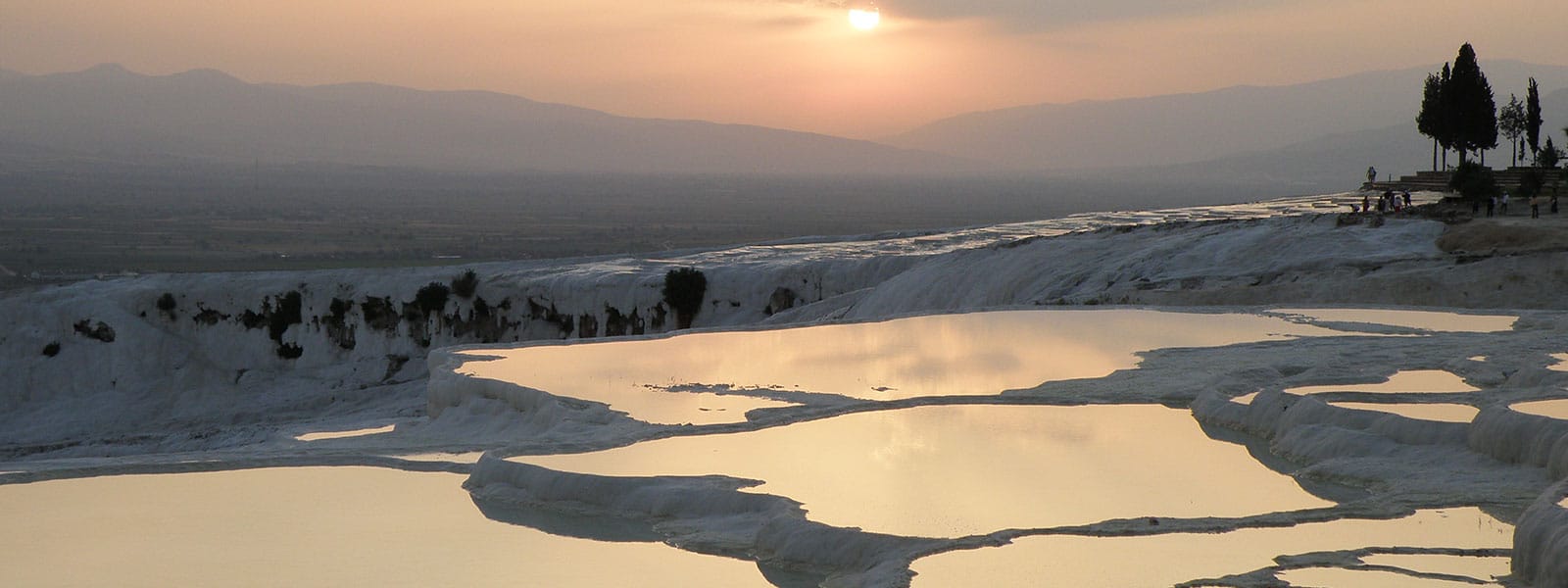
PAMUKKALE TOUR
The private tour of Pamukkale will take you to the classical Phrygia era at first when a little settlement was established by the hot springs around 3rd century BC. The area became a famous health center in the 2nd century BC during the reign of Eumenes II of Pergamon and has been used for healing purposes since then. The visit can be enjoyed daily thanks to the direct flights from Istanbul or on your way driving down south to Antalya from Cappadocia.
The citizen was right; the “Cotton Castle” in Turkish, is the glamorous result of the patient handiwork of mineral-rich hot waters of the plateau running downhill since the beginning of time. You can enjoy a little walk inside the blissful little pools or watch the fantastic layout sipping your tea.
Hierapolis was a well-known health center in the past too. Also had the Temple of Apollo- the famed Oracle center established by a praised old shrine of Cybele; thus enjoyed many prosperous and colorful centuries.
The oldest spa center in the world is at your service to take a dip. The Antique Pool originally from Roman age has been modernized with little restoration and awaiting you and your children if you are traveling with family to enjoy an outstanding holiday with its warm calcite-water and remains of fallen Ionic columns inside. Its beautiful setting adorned with pines, oleanders, palm trees, and flowers add to its charm.
Surreal formations in this beautiful location overlooking the plain down the slopes and the light and shadow games on the gorgeous remains of the city will give you endless chances to take extraordinary pictures all day long.
The Tour of Pamukkale
Your guide will walk you through the main street which was adorned by arcades on both sides where ancient citizens and visitors enjoyed pleasant evening strolls. The street was adorned by monumental gates on both ends; the three arched Domitian Gate is especially worth seeing for its graceful ornamentation.
The Temple of Apollo had a very peculiar location; it was built over an active fault called the Plutonium and was the oracle center for the region. Most probably there had been a shrine for Cybele in the vicinity during the Bronze Age, and the coming generations carried the tradition on. You will take a trip into depths of human psyche here as you learn about the evolution of prophecy and how it was at times used as a tool to manipulate the king, army commanders or simply the public.
The theater will be a perfect location to be during the sunset. Thousands of people felt the same awe, at the same place, at the same time of the day at uncountable sunsets and now it's your turn to be taken by this beauty. The theater is thought to be dating from the 1st century but like the rest of the city, it had to undergo various restorations after the frequent earthquakes of the region. Today the theater is praised as having one of the most complete and best-preserved collections of Greco-Roman theater decorations in Turkey. Examples are; Emperor Septimus Severus in procession with his family and the gods, another illustrates the life of Dionysus and also the gods Pan and Priapus. The third frieze shows a procession and sacrifice to the goddess Artemis and the punishment of Niobe.
The Necropolis is another best-preserved archaeological merit in Turkey. It is also the largest one extending over 2 km. and containing 1,200 tombs. Tombs are seen in several different forms in accordance with the deceased person's socioeconomic status and traditions.
Another place of interest is the octagonal Martyrium of St. Philip on top of the hill in the northeastern section of the city. He is said to have been buried here but his grave is not discovered in the excavations so far.
The once richly decorated monumental fountain, Nymphaeum from the 2nd century AD was dedicated to the nymphs and was a distribution center for the houses of the city via an unbelievable network of pipes.
The Roman Bath is used as the Hierapolis Archeology Museum today housing remains from Hierapolis city along with some of the neighboring ancient sites and some very important findings from Beycesultan Mound of Chalcolithic Age, 5500 - 3000 BC.
The artifacts in the museum are displayed in three large halls and part of the garden.




Pamukkale
You will have spare time to explore and enjoy this well-known natural wonder which gets its name from the white formations, especially from its stunning layout amongst abundant greenery in the plain. In Turkish, it means "cotton castle."
Some number of calcium carbonate-rich hot springs have been running down the hills since –who knows the real date?- and have been leaving their deposits on the hills gradually forming the terraces.
Due to slow volcanic activity, the water temperature changes between 35 degrees Centigrade to 100 degrees C. In the Antique Pool, water temperature is at the comfortable warmth and especially in summertime always lots of fun goes on in and around the pool area.
The travertine terraces and the spa have been major tourist attractions throughout the history-making the area famous, and Hierapolis has enjoyed long prosperous centuries welcoming the visitors. Even the emperors would come here to heal.
Recently, there are certain precautions to preserve the travertine of Pamukkale about which your guide will be pleased to inform you while enjoying your day tour.
Restaurants etc.: The service quality, including restaurants, are not as good as Ephesus or most places. So, our guide would still pick the best option available en route.
Swimsuits: If you would like to swim in Cleopatra’s Pool; you can bring your swimsuits and paying an extra admission; you can rent a locker along with the fee for the pool.
Shoes, slippers or tripods: Travertine pools admissions to be paid by us, and please note that tripods or shoes/slippers are not allowed in these pools.







